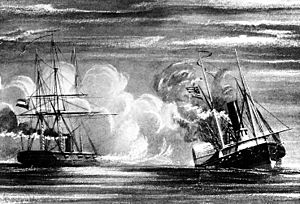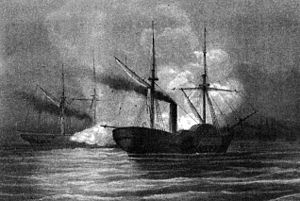Action off Galveston Light facts for kids
Quick facts for kids Action off Galveston Light |
|||||||
|---|---|---|---|---|---|---|---|
| Part of the American Civil War, Gulf of Mexico Raid | |||||||
 19th century print, depicting the sinking of Hatteras by CSS Alabama, off Galveston, Texas, 11 January 1863 |
|||||||
|
|||||||
| Belligerents | |||||||
| Commanders and leaders | |||||||
| Homer C. Blake | Raphael Semmes | ||||||
| Strength | |||||||
| 1 steamer | 1 sloop-of-war | ||||||
| Casualties and losses | |||||||
| 2 killed 5 wounded 118 captured 1 steamer sunk |
2 wounded 1 sloop-of-war damaged |
||||||
The Action off Galveston Light was a short sea battle during the American Civil War. It happened in January 1863. A Confederate ship, the CSS Alabama, met and sank a U.S. Navy ship, the USS Hatteras. This fight took place near the Galveston Lighthouse in Texas.
Contents
The Battle of Galveston Light
This battle was the first time the famous Confederate ship Alabama saw combat. It was a quick but important fight at sea.
What Happened Before?
The USS Hatteras was a steamer, a type of ship that used steam power. It weighed about 1,126 tons. Its captain was Homer C. Blake. The Hatteras was part of the Union blockade trying to stop ships from entering or leaving Galveston, Texas. It had a crew of 126 sailors and officers. The ship was armed with five naval guns.
The CSS Alabama was a different kind of ship, called a sloop-of-war. It weighed 1,050 tons and was commanded by Captain Raphael Semmes. The Alabama had a crew of 145 and was armed with eight powerful guns. It was known as a "commerce raider," meaning its job was to attack and capture or sink enemy merchant ships.
The Fight Begins
On January 11, 1863, around 3:00 PM, the Hatteras was on duty with other Union ships near Galveston. They spotted a ship far away on the horizon. Captain Blake was told to chase this unknown ship. If it was an enemy, he was supposed to capture it.
A Surprise Attack
The ship they were chasing was the CSS Alabama. The Hatteras chased the Alabama for over twenty miles until it got dark. When the Hatteras got close, its crew asked the other ship to identify itself. The Confederates tried to trick them by saying they were a British ship. Captain Blake then ordered a small boat to be lowered so his sailors could board the other ship.
But just as the boat was leaving, the Confederates shouted, "We're the CSS Alabama!" They quickly raised their flag and fired their guns. A powerful blast of cannon fire hit the left side of the Union ship.
The Battle's End
The Union sailors on the Hatteras were surprised, but they fired back. Their guns were much smaller than the Alabama's. The two ships fought for about thirteen minutes. Captain Semmes later described it as a "sharp and exciting" battle.
In the end, the USS Hatteras was badly damaged and slowly sinking. Its crew fired a signal gun to show they were giving up. Captain Blake ordered the ship's ammunition storage areas to be flooded. This was done to prevent a dangerous explosion. Sailors began jumping into the water. Boats from the Alabama were quickly lowered to rescue the survivors.
Two U.S. Navy sailors were killed in the battle. Five were wounded, and 118 were taken prisoner by the Confederates. The CSS Alabama was hit several times, but the damage was not serious. Only two Confederate sailors were wounded.
What Happened Next?
After sinking the Union steamer, the Confederates sailed away towards the South Atlantic. Some of the Union blockade ships tried to chase them, but they could not catch the Alabama. Later, Captain Semmes sailed his ship to Cherbourg-en-Cotentin, France. There, the Alabama was destroyed in another big battle by the USS Kearsarge.
The morning after the battle, the USS Brooklyn found the wreck of the USS Hatteras. It was resting on the bottom of the sea, about nine and a half fathoms (about 57 feet) deep. Only its masts were sticking out of the water. The ship's flag was still flying, even after it had sunk.
 | Selma Burke |
 | Pauline Powell Burns |
 | Frederick J. Brown |
 | Robert Blackburn |


